The Shakespeare Sonnet Project

The New York Shakespeare Exchange is working with filmmakers and directors to produce collaborative video adaptations of Shakespeare’s sonnets, bringing the Bard’s timeless poems to a new audience.
Jump to navigation Skip to content
Articles from Poet & Writers Magazine include material from the print edition plus exclusive online-only material.

The New York Shakespeare Exchange is working with filmmakers and directors to produce collaborative video adaptations of Shakespeare’s sonnets, bringing the Bard’s timeless poems to a new audience.

Now in its fifth year, the Pilgrim features original writing from members of Boston’s homeless community, who come together on a weekly basis to share their stories, hone their craft, and support each other’s personal and literary growth.

Editor Rob Spillman talks Tin House—the magazine, the books, the summer workshop—and the pleasures, perils, and surprises of independent publishing.
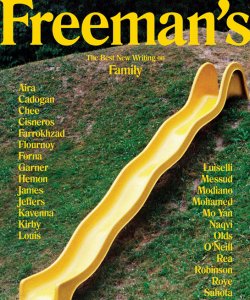
The next generation of literary journals—including these nine new publications, all founded within the past two years—is bringing new voices and editorial visions to a traditional form.
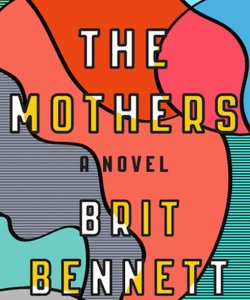
With so many good books being published every month, some literary titles worth exploring can get lost in the stacks. Page One highlights the first lines of a dozen recently released books, including Zadie Smith’s Swing Time and Fanny Howe’s The Needle’s Eye, offering a glimpse into the worlds of these new and noteworthy titles.

Read excerpts of the debut books by 2016’s 5 Over 50: Desiree Cooper, Sawnie Morris, Paul Vidich, Paula Whyman, and Paul Hertneky.

Writer and editor Daniel Menaker compiles over one hundred amusing verbal blunders in his new book, The African Svelte: Ingenious Misspellings That Make Surprising Sense (Houghton Mifflin Harcourt, 2016), illustrated by New Yorker cartoonist Roz Chast.

A roundup of new and emerging writers over the age of fifty whose debut books were published during the past year, featuring Desiree Cooper, Sawnie Morris, Paul Vidich, Paula Whyman, and Paul Hertneky.

The editor of the Georgia Review calls to retire a long-used publishing term, contending that unsolicited submissions are so much more than just “slush.”

Max Ritvo, the author of Four Reincarnations (Milkweed Editions, September), spoke with poet Dorthea Lasky two months before his death from cancer. He was twenty-five.

Upon the release of Another Brooklyn, her first novel for adults in twenty years, award-winning author Jacqueline Woodson discusses New York City’s literary legacy, the strength in being a person of color, putting humanity on the page, living in the age of Beyoncé, and happiness
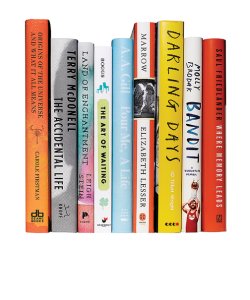

At the University of Pittsburgh, poets Dawn Lundy Martin, Terrance Hayes, and Yona Harvey recently established the Center for African American Poetry and Poetics—a creative think tank dedicated to African American poets.

In a continuing series, Debra W. Englander consults an author and events manager, as well as a CEO of a book-marketing firm, to provide self-published author Jonathan R. Miller valuable book-industry advice on his novel The Two Levels.

Literary MagNet highlights an author alongside the journals that have published that author’s work. This issue’s MagNet features fiction writer Matt Bell, who takes us through five journals that first published pieces appearing in his latest collection, A Tree or a Person or a Wall.

Fifty American poets and writers offer messages to the next commander in chief about what’s most important to them, and what they hope to see in the next four years.

Steph Burt, acclaimed critic, poet, and Harvard professor, talks about their path to becoming a poetry critic, working as both a poet and a critic, and how the internet has greatly expanded the conversations surrounding poetry and poetics.

Now in its second year, the BinderCon professional development conference, held biannually in New York and Los Angeles, works to champion and connect women and gender nonconforming writers.

Celebrating its fortieth anniversary this year, the Just Buffalo Literary Center offers workshops, youth programs, events, an international authors series, and an unmatched literary community in western New York.
Small Press Points highlights the innovation and can-do spirit of independent presses. This issue features the Salt Lake City–based Torrey House Press. Established in 2010 by Kristen Johanna Allen and Mark Bailey, the nonprofit press releases six to eight fiction titles each year that focus on the American West, specifically as it relates to human relationships and the natural world.
With so many good books being published every month, some literary titles worth exploring can get lost in the stacks. Page One offers the first lines of a dozen recently released books, including Jonathan Safran Foer’s Here I Am and Monica Youn’s Blackacre, as the starting point for a closer look at these new and noteworthy titles.

Tracy Sherrod, current editorial director of Amistad Press, discusses how the publisher of multicultural voices has changed over its thirty-year history, as well as the challenges it faces today.

What do Ann Patchett, Jeff Kinney, Louise Erdrich, and Judy Blume have in common? Aside from being best-selling authors, they are all also dedicated booksellers, each having opened independent bookstores of their own.
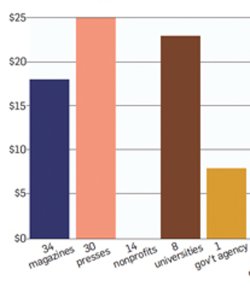
As part of a continuing series, we offer a breakdown of the numbers behind our Grants & Awards listings.
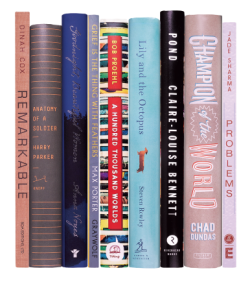
As part of our sixteenth annual First Fiction roundup, in which five debut authors—Yaa Gyasi, Masande Ntshanga, Rumaan Alam, Maryse Meijer, and Imbolo Mbue—discuss their first books, we picked nine more notable debuts that fans of fiction should consider reading this summer.